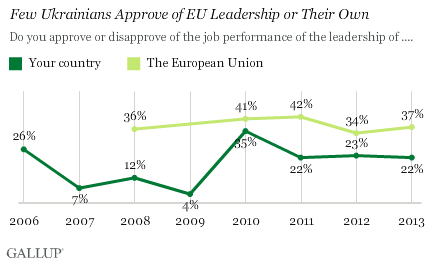WASHINGTON, D.C. -- Ukrainian President Viktor Yanukovich's decision last week to back away from a trade deal with the European Union sparked the biggest protests Ukraine has seen since the 2004 Orange Revolution. But Ukrainians' protests are more likely the product of their long-simmering discontent with their own country's leadership than their desire to be closer to Europe. Ukrainians are not enamored with Europe. A weak 37% approve of the EU's leadership.

However, Ukrainians are even less thrilled with their own country's leadership. Since 2006, only a minority of Ukrainians have approved of the job their leaders are doing. Their lowest approval rating was 4% in 2009 during Viktor Yushchenko's presidency and the highest rating was 35% when Yanukovich came to power.
These anemic approval ratings are likely rooted in Ukraine's fragile economic situation, which may be making a free trade deal with the EU seem even more attractive right now to Ukrainians. With the country slipping into its third recession since 2008 this year, only 10% of Ukrainians say their country's economy is getting better.
The government's perceived inability to curb widespread corruption is certainly not scoring any points with citizens either. The majority of Ukrainians (63%) in 2013 say corruption is higher now than it was five years ago, and most (84%) believe the government is not doing enough to fight it.
Implications
After Ukraine's government survived a no-confidence vote Tuesday, the prime minister extended a hand to protesters. But while the government says it is open to dialogue, Gallup data suggest the divide may be too great to bridge quickly.
For complete data sets or custom research from the more than 150 countries Gallup continually surveys, please contact us.
Survey Methods
Results are based on face-to-face interviews with 1,000 adults, aged 15 and older, conducted in June 27-July 31, 2013, in Ukraine. For results based on the total sample of national adults, one can say with 95% confidence that the maximum margin of sampling error is ±3.7 percentage points. The margin of error reflects the influence of data weighting. In addition to sampling error, question wording and practical difficulties in conducting surveys can introduce error or bias into the findings of public opinion polls.
For more complete methodology and specific survey dates, please review Gallup's Country Data Set details.
